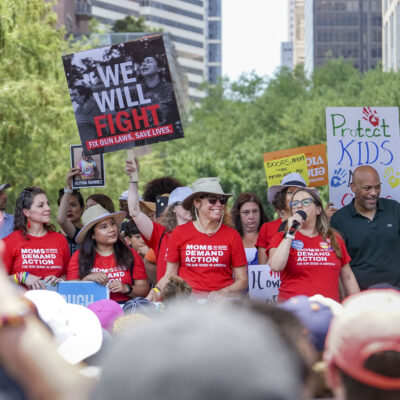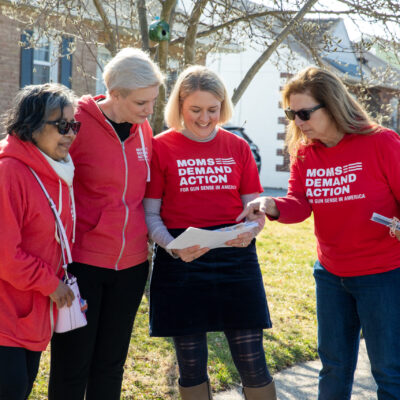Gun laws—good and bad—are changing in states across the country: Here’s what’s going into effect in July 2021
This year, state legislatures have been at the epicenter of major shifts in gun safety laws. States across the country are passing critical gun safety reform, including police accountability, funding for violence intervention programs, and strengthening background checks. But in other states, lawmakers have ignored calls for gun reform and instead are doubling down on the gun lobby’s efforts to dismantle life-saving gun safety laws.
A number of these new gun laws will go into effect this month. These laws can have a direct impact on our communities and affect our likelihood of experiencing gun violence in our daily lives.
We saw significant advancements for our movement this year. We’re so proud to have partnered with gun sense lawmakers who championed legislation that will truly save lives. Lawmakers advocated for gun safety by sponsoring police accountability legislation, prioritizing laws that keep our kids and families safe, and responding with action after mass shootings in their communities.
Other state lawmakers, backed by the gun lobby, fought hard to pass extreme gun bills to weaken our gun laws. Some even went as far as to ignore strong public opposition from constituents and law enforcement and bent their legislative rules in order to jam through extreme policies and their guns-everywhere agenda. We were successful in blocking some of these dangerous bills, but unfortunately not all of them.
But elected leaders that chose to weaken their gun laws won’t stop us. As always, we will continue our vital in-state work to advocate for gun safety and organize alongside community partners.
Despite the challenges of the pandemic, the grassroots organizing efforts of Moms Demand Action and Students Demand Action volunteers persisted. When it wasn’t safe to go to the State Capitol or testify in-person, they testified virtually and used the power of social media to advocate for gun safety—creating video explainers to advocate for bills they wanted passed and firing off tweets at their lawmakers to pressure them not to cave to the gun lobby on dangerous bills.
So what does gun safety look like now in your state? Check out our list of key new gun laws to see what’s going into effect this month.
Thank you for being in this movement,
Monisha Smith
Director of State Government Affairs
State Gun Laws Going Into Effect in July 2021
Key
✅ = Law will strengthen gun safety
❌ = Law will weaken gun safety
Arkansas

What’s Going Into Effect
-
July 30
❌ “Stand Your Ground” law -
July 30
❌ Two laws that attempt to nullify federal gun laws in the state. These laws will prohibit law enforcement and other public officials from helping enforce these nullified federal acts, even subjecting them to criminal penalties and decertification if they do so.
What This Means for Arkansas
“Stand Your Ground” laws allow people to shoot others in public and avoid justice, even when the shooter can safely de-escalate the situation by walking away. Unfortunately, we’ve seen this law associated with increases in firearm homicides in other states.
Law enforcement will be limited in their ability to enforce federal gun safety laws, taking away critical tools they rely upon to keep guns out of the hands of criminals and abusers. It’s also unconstitutional.
Colorado

What’s Going Into Effect
-
July 1
✅ Requires firearms that children or a prohibited person could access be securely stored, either with a locking device or inside a locked gun safe, when not in the control of the gun’s owner
What This Means for Colorado
Secure storage of firearms is key to reducing unintentional shootings and suicides by children and teens. This law will ensure a culture of shared responsibility for gun violence prevention and protect against unauthorized firearm access.
Iowa

What’s Going Into Effect
-
July 1
❌ Repeal of state background check requirements for unlicensed handgun sales -
July 1
❌ Permit no longer required in order to carry a concealed handgun in public
What This Means for Iowa
Iowans are no longer required to obtain a permit to purchase a handgun, nor to carry a concealed handgun in public. Permits require a background check—so under the new law, unless someone purchases a handgun from a federally-licensed firearms dealer, they can buy a handgun without a background check.
This will make it easier than ever for people who shouldn’t have access to guns, like violent criminals and domestic abusers, to access them and to walk around our state with a loaded, concealed gun.
New Mexico

What’s Going Into Effect
-
July 1
✅ Eliminates qualified immunity for state and local law enforcement
What This Means for New Mexico
New Mexicans can now sue law enforcement when their rights have been violated. Qualified immunity is a huge institutional barrier to accountability for police misconduct and police violence, and New Mexico is the second state in the country to eliminate it!
South Dakota

What’s Going Into Effect
-
July 1
❌ Expansion of “Stand Your Ground” law
What This Means for South Dakota
South Dakota’s already-dangerous “Stand Your Ground” law will get worse. It’s already legal for people to shoot to kill another person in public spaces (even if there are clear and safe ways to diffuse or walk away from the situation). Shooters are now afforded both broad criminal and civil immunity—making it even more difficult for true justice for survivors of gun violence and families of the victim.
Tennessee

What’s Going Into Effect
-
July 1
❌ Strips permitting and training standards for carrying concealed guns in public, allowing people to carry a loaded firearm in public without a background check or any safety training.
What This Means for Tennessee
Background checks, safety training, and permits are essential safety standards to carry concealed guns in public. Anyone, including extremists and white supremacists, can now carry a loaded firearm in public without requiring these critical safeguards to responsible gun ownership.
Virginia

What’s Going Into Effect
-
July 1
✅ Prohibits carrying of firearms at polling places -
July 1
✅ Prohibits carrying of firearms at State Capitol & capitol grounds -
July 1
✅ Ensures guns are not allowed at public schools -
July 1
✅ Extends the time—from 3 days to now 5 days—a dealer must await the results of a background check before they can proceed with a gun sale.
What This Means for Virginia
Virginia residents who are participating in democratic processes at the State Capitol and polling places should not have to worry about armed extremists or others who carry firearms with the intent to intimidate. Keeping firearms out of these locations, as well as public schools, makes everyone safer.
Washington

What’s Going Into Effect
-
July 25
✅ Bans police use of chokeholds, no-knock warrants, and police acquisition of military equipment from the federal government -
July 25
✅ Establishes the Office of Independent Investigations, along with a process for investigating police conduct that includes civilians -
July 25
✅ Allows state-commissioned audits of deadly force investigations conducted by peace officers and law enforcement agencies. -
July 25
✅ Expands the authority of the Criminal Justice Training Commission to include investigations of potential criminal conduct arising from police use of force, including custodial injuries and officer-involved incidents -
July 25
✅ Requires data collection and analysis on police use of force incidents
What This Means for Washington
This set of laws is historic for police reform in Washington. These are important steps to improving public safety, which should also help curb police violence, demilitarize the police, and improve oversight on law enforcement.
West Virginia

What’s Going Into Effect
-
July 9
❌ Prohibits law enforcement, prosecutors, and other state officials from cooperating in the enforcement of federal gun safety laws
What This Means for West Virginia
This limits state and local law enforcement’s ability to partner with their federal counterparts to enforce federal gun safety laws, including those aimed at combating gun trafficking and keeping guns out of the hands of people with dangerous histories.
The Latest

State-Level Wins We’re Celebrating From the 2025 State Legislative Sessions
Everytown welcomes you to the National Conference of State Legislatures
Calculate the Economic Cost of Gun Violence Do you want to know. . . how much gun violence over the last weekend cost? the economic…
State lawmakers are so beholden to the NRA, they’ve ignored public opposition to permitless carry. Here’s why that’s dangerous.
A permitless carry law goes into effect in Texas on September 1—making it the 20th state to allow permitless carry. Despite massive public opposition to…
Washington Moms Demand Action and Students Demand Action volunteers advocated for—and won—historic police reform this legislative session
Thanks to the leadership of families impacted by police violence and organizations like the Washington Coalition for Police Accountability—and to the tireless advocacy of…





